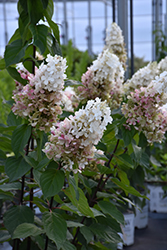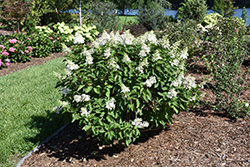Height: 10 feet
Spread: 10 feet
Sunlight:
![]()
![]()
![]()
Hardiness Zone: 3
Brand: Proven Winners
Description:
A beautiful long-season bloomer featuring cones of mixed sterile and fertile white flowers in mid to late summer which transform to a rich pink; an improved version of 'Pinky Winky' hydrangea with larger, fuller flower heads and deeper hot pink color
Ornamental Features
Pinky Winky Prime® Hydrangea features bold conical white flowers at the ends of the branches from mid summer to late fall. The flowers are excellent for cutting. It has green deciduous foliage. The textured pointy leaves do not develop any appreciable fall color.
Landscape Attributes
Pinky Winky Prime® Hydrangea is a multi-stemmed deciduous shrub with an upright spreading habit of growth. Its relatively coarse texture can be used to stand it apart from other landscape plants with finer foliage.
This shrub will require occasional maintenance and upkeep, and is best pruned in late winter once the threat of extreme cold has passed. It has no significant negative characteristics.
Pinky Winky Prime® Hydrangea is recommended for the following landscape applications;
- Accent
- Mass Planting
- General Garden Use
Planting & Growing
Pinky Winky Prime® Hydrangea will grow to be about 10 feet tall at maturity, with a spread of 10 feet. It tends to be a little leggy, with a typical clearance of 2 feet from the ground, and is suitable for planting under power lines. It grows at a medium rate, and under ideal conditions can be expected to live for 40 years or more.
This shrub performs well in both full sun and full shade. It prefers to grow in average to moist conditions, and shouldn't be allowed to dry out. To help this plant achive its best flowering performance, periodically apply a flower-boosting fertilizer from early spring through into the active growing season. It is not particular as to soil type or pH. It is highly tolerant of urban pollution and will even thrive in inner city environments. Consider applying a thick mulch around the root zone in both summer and winter to conserve soil moisture and protect it in exposed locations or colder microclimates. This is a selected variety of a species not originally from North America.



